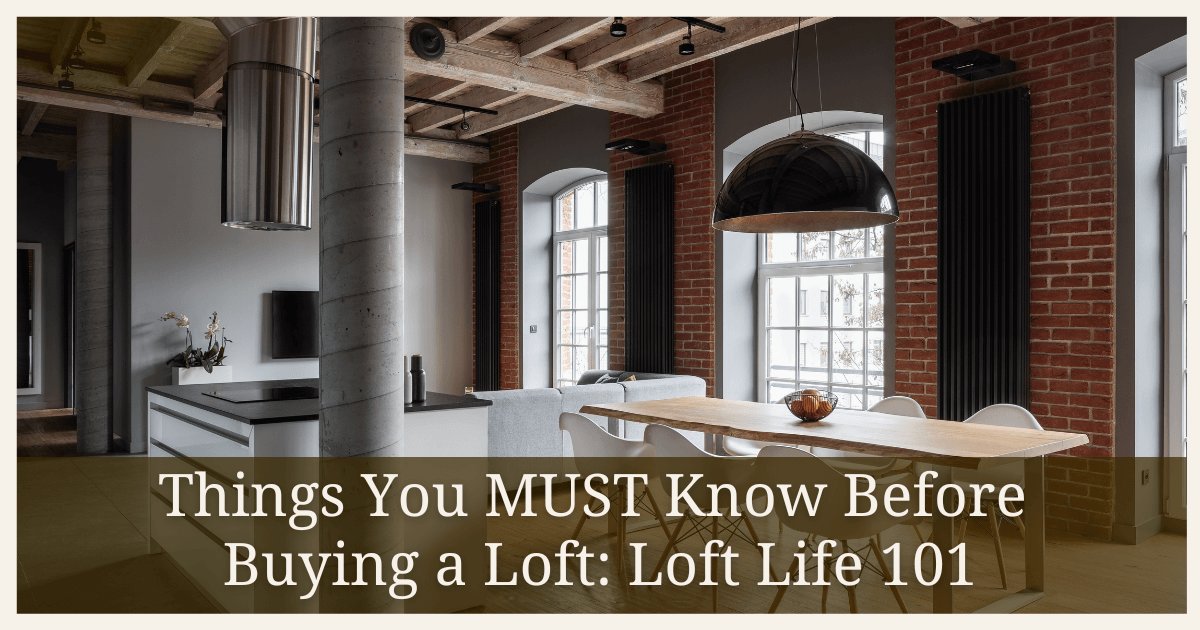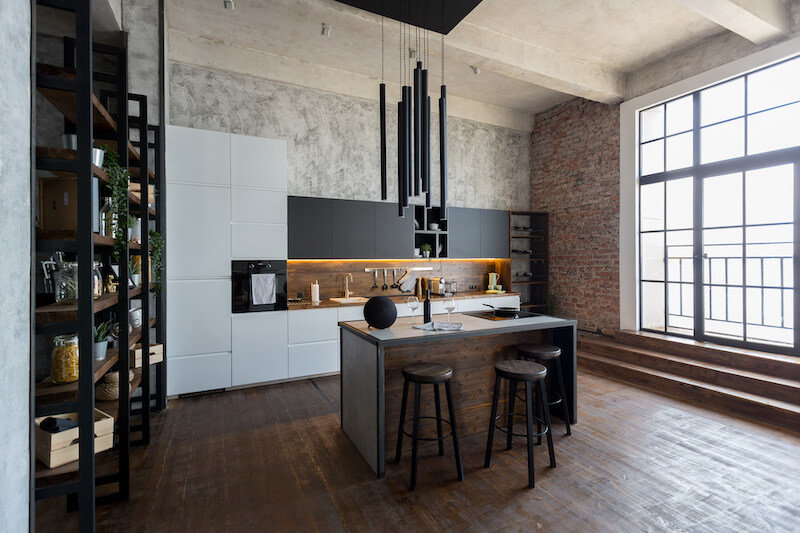5 Things You MUST Know Before Buying a Loft: Loft Life 101
Posted by EdmontonRealEstate .ca on Wednesday, September 13th, 2023 at 10:28am.

With their unique floor plans and near-endless options for customization, lofts are one of the most popular property types among condo buyers. These spacious, often historic spaces offer a unique blend of architectural charm and modern aesthetics, ideally suited for any downtown dweller. However, before diving into the world of loft ownership, it's essential to ensure your investment is sound and aligns with your lifestyle. Uncover the most important things you need to know before buying the loft of your dreams.
What Is a Loft?
What's the difference between a condo, a loft, and an apartment? All lofts are either a condo or an apartment, but not all condos and apartments are lofts. A loft is a style of multi-family living unit with a distinct history and aesthetic appeal that sets it apart.
Historically, lofts were born from the adaptive reuse of industrial buildings, including warehouses and factories. The concept took root in the 1970s in New York City, where the expansive interiors of such buildings were transformed into living spaces, blending the rugged charm of industrial structures with residential comfort. This gave rise to what we now know as "industrial-chic" aesthetics.
Over time, the style gained popularity, revealing three main variations of lofts:
- Hard Loft: Often regarded as the "true" loft, a hard loft refers to living spaces directly converted from commercial or industrial settings. They typically maintain much of the original architectural elements, such as exposed brick walls, wooden beams, and high ceilings.
- Soft Loft: While bearing many resemblances to the hard loft in terms of design, a soft loft is a newer construction aiming to replicate the aesthetics of traditional lofts. Although they exude the industrial-chic feel, they might be equipped with modern amenities and conveniences, making them more suitable for those who want the loft experience without compromising on modern comforts.
- Live-Work Loft: As the name suggests, these are dual-purpose spaces. Common in bustling urban settings, a live-work loft typically comprises a commercial space on the ground floor (like a shop or restaurant) with a lofted living area above or behind it. This setup is particularly advantageous for entrepreneurs and business owners, allowing them to integrate their living and working environments seamlessly.
While the essence of a loft emanates from its industrial heritage, its modern interpretations and variations offer diverse options for today's homeowners. Each type of loft offers a unique blend of history, aesthetics, and function, making it essential for prospective buyers to understand their nuances before deciding.
How Is Buying a Loft Different from Other Property Types?
Purchasing a loft generally adheres to the basic steps followed in all real estate transactions.However, nuances and specific considerations distinguish the process from buying more conventional property types.
Unlike standalone properties, lofts are often overseen by a condo board or homeowners' association. This board is responsible for managing common elements, enforcing rules, and maintaining the overall integrity of the building or complex.
Being under the jurisdiction of a condo board usually entails monthly or annual fees from all unit owners to cover costs associated with communal areas, amenities, and sometimes even utilities. Before purchasing, it's crucial to understand these fees, what they cover, and any potential for them to increase.
Additionally, each condo board or association will have its bylaws and regulations. These can encompass anything from pet policies and renovation restrictions to rules about renting out the loft. Potential buyers must review these rules thoroughly to ensure they align with their lifestyle and plans.
Pros of Living in a Loft

Lofts offer an unparalleled blend of style, space, and function. Their unique features and advantages make them stand out from your average condo or apartment.
- Open floor plan: Lofts typically come with a spacious, open-concept design. Open-concept floor plans allow residents to customize their living spaces according to their preferences. Instead of being constricted by a pre-determined layout, they can put up partitions, create manipulable segments, or enjoy the expansiveness.
- Unique aesthetic appeal: The industrial-chic aesthetics of lofts, characterized by exposed brick walls, wooden beams, and large windows, provide a distinct character that stands out from traditional condos or apartments. A loft is perfect for those who value uniqueness in their living space.
- Location: Lofts are commonly found in downtown areas, meaning residents often enjoy the benefits of living in the heart of their city. Residents will typically have shorter commutes and easy access to cultural hotspots, dining, entertainment, and other amenities.
- Historical value: When living in a converted loft, there's often a connection to the past. Once bustling with industrial activity, these spaces carry a rich history that adds depth and narrative to the resident's modern-day experiences.
Downsides of Owning a Loft
While lofts offer distinctive aesthetics and versatility, they also come with challenges that potential buyers should know. Here are some disadvantages of owning or living in a loft:
- Lack of privacy: Given the open-concept nature of most lofts, privacy can be a concern, especially if multiple people share the space. Often, fewer walls separate living, sleeping, and working areas. However, residents can remedy this problem and create extra space using partitions and other moveable walls.
- Acoustic challenges: The same high ceilings and open spaces that give lofts their appeal can result in poor sound insulation. Sounds can reverberate, making the area noisy. It's worth noting that what you hear when touring an empty loft will differ from what the loft will sound like when living in it. In addition to the insulation provided by furniture and possessions, you can hire a professional to balance the acoustics further.
- Heating and cooling issues: High ceilings can pose challenges for heating and cooling. Warm air tends to rise, which may make the space colder in winter and require more effort to heat. Conversely, larger open spaces can be harder to cool during hot summers. Therefore, prioritizing HVAC care and maintenance in a loft is crucial.
- Maintenance of original features: For those in hard lofts, maintaining original architectural features like brick walls, wood beams, and large windows can sometimes be labour-intensive and costly.
While lofts offer a unique and captivating living experience, potential owners or renters must weigh these challenges against the benefits. Being informed about the drawbacks will ensure a more satisfying and comfortable loft living experience.
Is a Loft a Good Investment?
Like any real estate investment, the value proposition of a loft is multifaceted and depends on several factors. For starters, location is paramount. Lofts in thriving urban areas with strong job markets, cultural amenities, and good infrastructure often appreciate faster than those in less desirable locations.
Supply and demand also play an essential role. Given their historical and architectural significance, original hard lofts are often limited. This scarcity can drive up demand and prices, especially in cities where industrial conversions are popular.
Lofts sometimes appreciate more than single-family homes; owners can profit by renting out their units. The spacious floor plans and central locations often command generous rental prices that provide reliable passive income.
Are You Ready to Buy a Loft?
Understanding the intricacies of loft ownership, from the nuances of condo board management to the unique architectural features, is essential. By thoroughly researching, considering both the benefits and potential challenges, and seeking expert guidance, aspiring loft owners can ensure they make a well-informed decision that will yield both personal satisfaction and long-term value.

